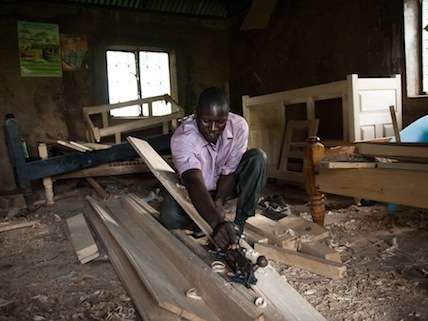A Privately Funded Experiment in a Universal Basic Income
Dozens of villages in Kenya will soon be receiving payments.

A U.S.-based group is preparing a pilot program in Kenya that will test the effects of a universal basic income—the increasingly popular concept of giving virtually everyone in a community unconditional payments on a regular basis. Unlike past large-scale experiments of this sort, this one is being run and funded privately.
The organization behind the effort is GiveDirectly, a charity whose work in Africa is based on the idea of giving people cash without restrictions on how the money can be spent. (The underlying anti-paternalist principle is that the needy know their needs better than outsiders do.) That outlook led naturally to an interest in the basic income, and so the organizers conceived a randomized control trial:
• In one set of villages, every adult will receive monthly payments equivalent to 75 cents a day for two years.
• In another set of villages, every adult will receive such payments for 12 years.
• In yet another set of villages, the adults will receive a single lump-sum payment equivalent to what the two-year group will be receiving.
• The last set of villages is the control group, so they don't get any money at all.
The aim here, GiveDirectly's Ian Bassin explains, is "to isolate the effects of what most people consider a 'basic income'—that is, a permanent payment over time—from something resembling more traditional temporary supports. For example, when someone knows they have a long-term, guaranteed floor below which they cannot fall, do they take more risks like starting a business or going back to school? And does that security produce greater overall returns?"
The current plan is for 41 villages to go on the 12-year plan, 80 to go on the two-year plan, 80 to get the lump sums, and 100 to be in the control group. (The size of each category could shrink if GiveDirectly doesn't hit its fundraising target.) To answer the first question that probably popped into your minds: No, a villager can't change which deal he's getting by moving from one town to another. Once enrollment has started in a village, no new arrivals can take advantage of the payments there. Conversely, if you're already enrolled in the program, you still get the money if you leave your village. After all, one potential outcome the researchers want to look for is whether people will use their payments to move somewhere with greater opportunity.
The group expects the experiment to cost about $30 million, and they have thus far raised around $23 million toward that. (The lump-sum payments are being funded separately, with the money coming from GiveDirectly's ongoing efforts in Kenya. They expect the costs there to be a little higher than $6 million, which is well within the program's usual annual budget.) One village in the 12-year group is already receiving funds—sort of a test case to work out any logistical kinks in advance. If all goes according to plan, the rest will start receiving their money early next year.


Show Comments (117)